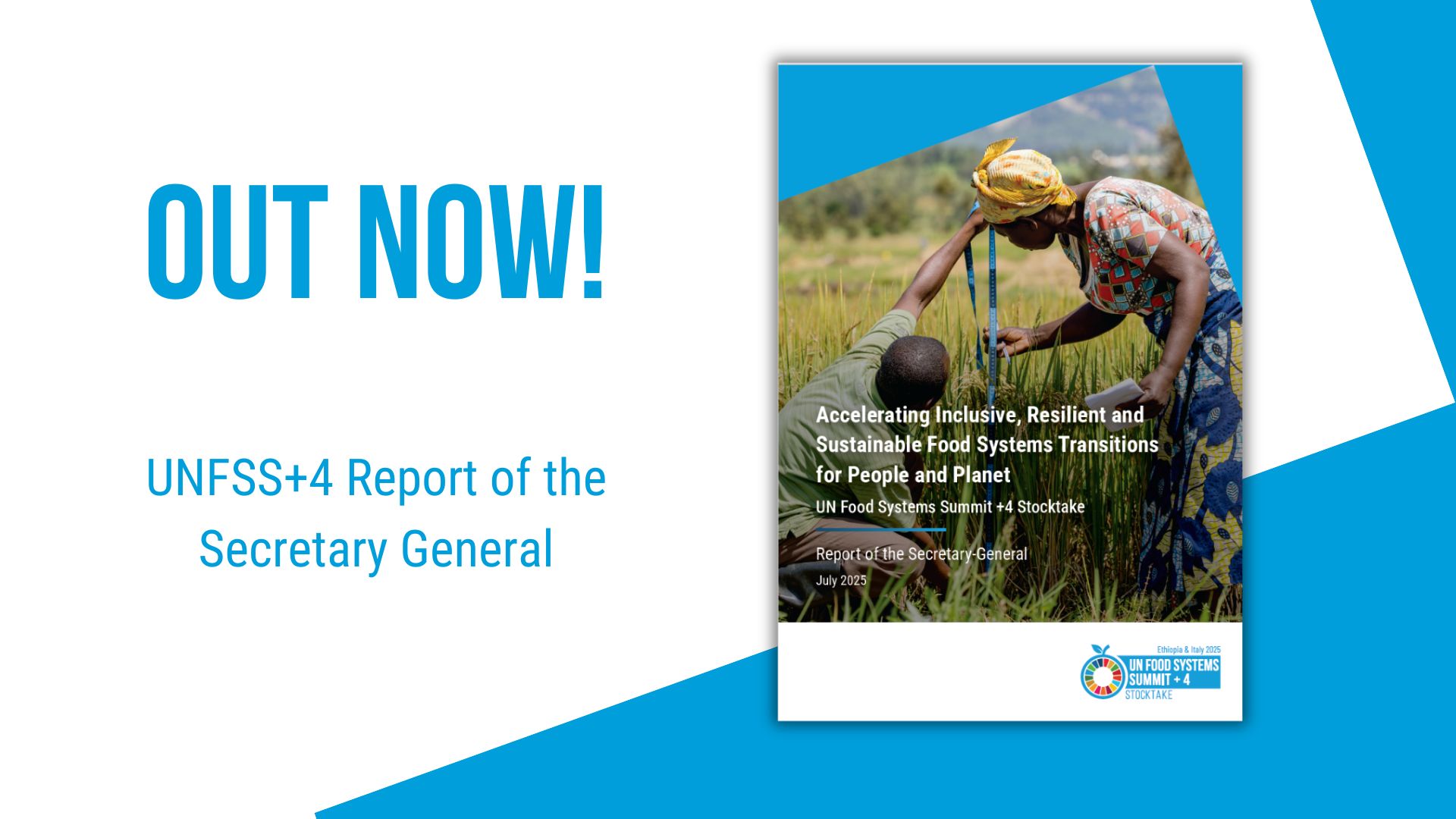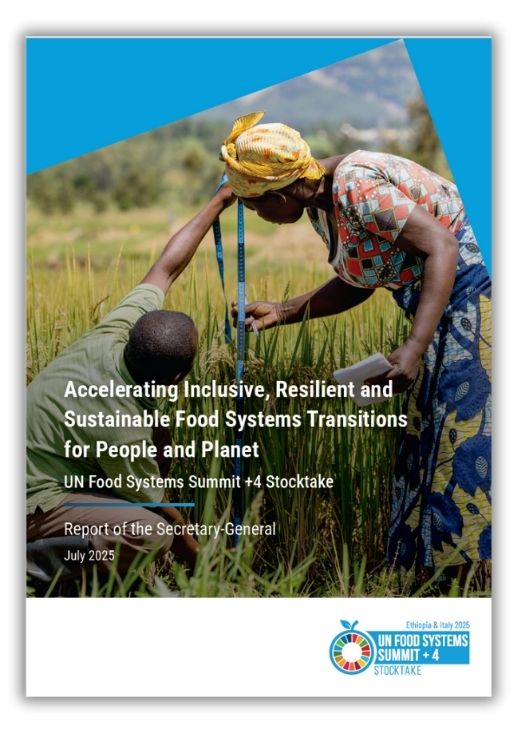OVERVIEW AND UPDATES
About UNFSS+4
The 2nd United Nations Food Systems Summit Stocktake (UNFSS+4) will take place July 27–29, 2025, in Addis Ababa, Ethiopia, co-hosted by Ethiopia and Italy. Building on the momentum of the 2021 UN Food Systems Summit (UNFSS) and the first Stocktake in 2023 (UNFSS+2), this event will reflect on global progress in food systems transformation, strengthen collaboration, and unlock finance and investments to accelerate action towards the 2030 Sustainable Development Goals (SDGs).
With just five years remaining until 2030, UNFSS+4 will serve as a critical moment to reflect on national efforts, explore solutions, and mobilize stakeholders toward sustainable, resilient, and inclusive food systems.
.png?sfvrsn=5d82f83a_1)

KEY DATES AND STRUCTURE
- July 27-29 , 2025 | Addis Ababa, Ethiopia
The high-level opening will include participation from heads of state and government, and other global leaders.
A pre-summit session will also take place, where civil society – including youth, Indigenous groups, smallholder farmers, and women’s organizations – will lead discussions on the future of food systems transformation.
Why UNFSS+4 Matters
The 2021 UN Food Systems Summit (UNFSS) positioned food systems as a key lever for the sustainable development agenda. However, geopolitical challenges, ongoing conflicts, and the climate crisis have hindered progress. UNFSS+4 aims to address these challenges by reinforcing commitments made at previous summits, aligning global priorities, and accelerating practical solutions.
.png?sfvrsn=fd4fd9b9_1)
Building on UNFSS+2: The Call to Action
At UNFSS+2 in 2023, the UN Secretary-General issued a Call to Action for accelerated food systems transformation, urging governments and stakeholders to:
- Integrate food systems strategies into all national policies for sustainable development.
- Strengthen governance frameworks to engage all sectors and stakeholders.
- Invest in research, data, innovation and technology capacities, including stronger connections to science.
- Promote inclusive participation of women, youth, and Indigenous communities.
- Expand private sector engagement through sustainable business practices.
- Improve access to financing and concessional funding for food systems transformation.
Objectives of UNFSS+4
Reflecting on progress
Reflecting on achievements and identifying lessons learned, while analyzing the factors that have enabled success in various contexts. This will provide a foundation for understanding gaps and scaling transformative solutions.
Strengthening partnerships and tracking commitments
Advancing inclusive, rights-based collaboration and mutual accountability by aligning efforts, tracking progress, and engaging all actors—especially marginalized groups—to accelerate sustainable, resilient, and equitable food systems transformation.
Unlocking investments
Exploring opportunities for financing innovations and scaling solutions, with a focus on creating enabling environments, leveraging public-private partnerships, and mobilizing climate and development finance to support transformative actions at scale.
Stay Updated
Regular updates, event briefings, and engagement opportunities will be shared leading up to UNFSS+4. Subscribe to our mailing list to informed.

Launch of UNFSS+4 Report: Scaled-up action needed to transform food systems by 2030

28 July 2025 – Addis Ababa The United Nations today launched the Report of the Secretary-General for the Second Food Systems Summit Stocktake (UNFSS+4), calling for accelerated action to transform the world’s food systems as a cornerstone of delivering the 2030 Agenda for Sustainable Development. The report comes at a pivotal moment, five years before the SDG deadline, and outlines both the growing momentum and the urgent need to scale up inclusive, rights-based, and resilient food systems transformation globally.
The 2021 United Nations Food Systems Summit marked a turning point by recognizing food systems as fundamental to achieving all 17 Sustainable Development Goals. Two years later, the first Stocktake (UNFSS+2) reaffirmed countries’ commitments. Now, the UNFSS+4 Report reveals that a more coordinated and diverse community of governments, UN agencies, civil society, Indigenous Peoples, youth, farmers, businesses and others is working together to align food systems pathways with broader national and global development goals.
The Report notes that by 2025, 128 countries had developed national food systems transformation pathways, with 155 having appointed National Convenors. Of these, 39 countries revised and updated their pathways into more actionable implementation plans. In a significant increase in accountability, 112 countries voluntarily submitted progress reports in 2025, up from 101 in 2023.
Key trends from the report include:
- The right to food is gaining ground, with countries placing it at the heart of national strategies and, in some cases, enshrining it in constitutions and legislation.
- Policy integration is deepening, as governments embed food systems into national development plans, budget frameworks, and climate and biodiversity strategies.
- Governance mechanisms are becoming more fit-for-purpose, with countries establishing high-level, cross-sectoral bodies to oversee implementation.
- Coalitions and partnerships are expanding, with 20 of the original 31 UNFSS Coalitions of Action continuing to provide critical support through advocacy, technical assistance and financing.
- Inclusivity is being prioritized, with governments advancing policies that centre women, youth, Indigenous Peoples, persons with disabilities and smallholder producers.
- UN support is intensifying, with Resident Coordinators and UN Country Teams working closely with governments to align efforts across agencies and sectors.
- Science, data and technology are driving change, with increased investments in AI, digital tools and evidence-based decision-making.
- Financing is mobilizing, though challenges remain. Countries report reallocating national budgets, accessing climate funds, and engaging with regional and international financial institutions, including through blended finance and innovative instruments.
As the world approaches the halfway mark between the 2021 Summit and the 2030 deadline, the UNFSS+4 Report emphasizes the critical role of the multilateral system in delivering resilience and solutions. Looking ahead, global milestones such as the World Summit for Social Development and COP30 are expected to build on the outcomes of UNFSS+4, linking food systems transformation to decent jobs, energy access and affordability, digital connectivity, education, employment and social protection, and climate change, biodiversity loss and pollution.
 The UNFSS+4 Report of the Secretary-General is available here. |
